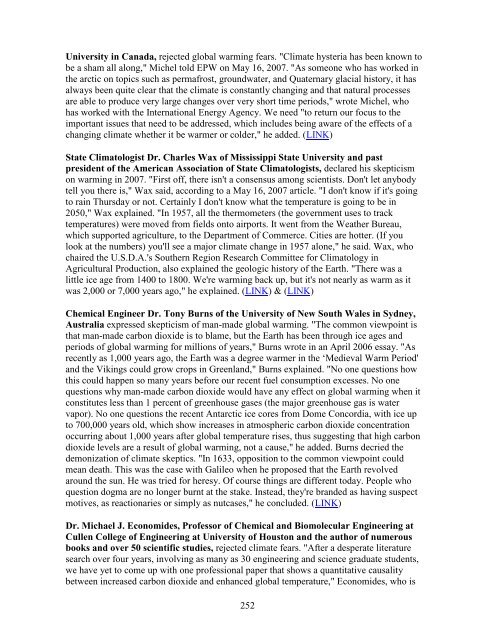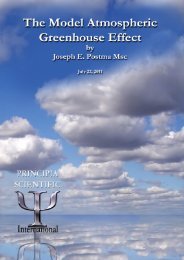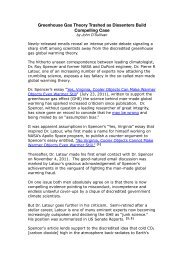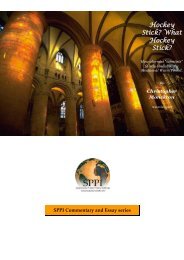Than 1000 International Scientists Dissent Over Man-Made Global ...
Than 1000 International Scientists Dissent Over Man-Made Global ...
Than 1000 International Scientists Dissent Over Man-Made Global ...
You also want an ePaper? Increase the reach of your titles
YUMPU automatically turns print PDFs into web optimized ePapers that Google loves.
University in Canada, rejected global warming fears. "Climate hysteria has been known to<br />
be a sham all along," Michel told EPW on May 16, 2007. "As someone who has worked in<br />
the arctic on topics such as permafrost, groundwater, and Quaternary glacial history, it has<br />
always been quite clear that the climate is constantly changing and that natural processes<br />
are able to produce very large changes over very short time periods," wrote Michel, who<br />
has worked with the <strong>International</strong> Energy Agency. We need "to return our focus to the<br />
important issues that need to be addressed, which includes being aware of the effects of a<br />
changing climate whether it be warmer or colder," he added. (LINK)<br />
State Climatologist Dr. Charles Wax of Mississippi State University and past<br />
president of the American Association of State Climatologists, declared his skepticism<br />
on warming in 2007. "First off, there isn't a consensus among scientists. Don't let anybody<br />
tell you there is," Wax said, according to a May 16, 2007 article. "I don't know if it's going<br />
to rain Thursday or not. Certainly I don't know what the temperature is going to be in<br />
2050," Wax explained. "In 1957, all the thermometers (the government uses to track<br />
temperatures) were moved from fields onto airports. It went from the Weather Bureau,<br />
which supported agriculture, to the Department of Commerce. Cities are hotter. (If you<br />
look at the numbers) you'll see a major climate change in 1957 alone," he said. Wax, who<br />
chaired the U.S.D.A.'s Southern Region Research Committee for Climatology in<br />
Agricultural Production, also explained the geologic history of the Earth. "There was a<br />
little ice age from 1400 to 1800. We're warming back up, but it's not nearly as warm as it<br />
was 2,000 or 7,000 years ago," he explained. (LINK) & (LINK)<br />
Chemical Engineer Dr. Tony Burns of the University of New South Wales in Sydney,<br />
Australia expressed skepticism of man-made global warming. "The common viewpoint is<br />
that man-made carbon dioxide is to blame, but the Earth has been through ice ages and<br />
periods of global warming for millions of years," Burns wrote in an April 2006 essay. "As<br />
recently as 1,000 years ago, the Earth was a degree warmer in the ‗Medieval Warm Period'<br />
and the Vikings could grow crops in Greenland," Burns explained. "No one questions how<br />
this could happen so many years before our recent fuel consumption excesses. No one<br />
questions why man-made carbon dioxide would have any effect on global warming when it<br />
constitutes less than 1 percent of greenhouse gases (the major greenhouse gas is water<br />
vapor). No one questions the recent Antarctic ice cores from Dome Concordia, with ice up<br />
to 700,000 years old, which show increases in atmospheric carbon dioxide concentration<br />
occurring about 1,000 years after global temperature rises, thus suggesting that high carbon<br />
dioxide levels are a result of global warming, not a cause," he added. Burns decried the<br />
demonization of climate skeptics. "In 1633, opposition to the common viewpoint could<br />
mean death. This was the case with Galileo when he proposed that the Earth revolved<br />
around the sun. He was tried for heresy. Of course things are different today. People who<br />
question dogma are no longer burnt at the stake. Instead, they're branded as having suspect<br />
motives, as reactionaries or simply as nutcases," he concluded. (LINK)<br />
Dr. Michael J. Economides, Professor of Chemical and Biomolecular Engineering at<br />
Cullen College of Engineering at University of Houston and the author of numerous<br />
books and over 50 scientific studies, rejected climate fears. "After a desperate literature<br />
search over four years, involving as many as 30 engineering and science graduate students,<br />
we have yet to come up with one professional paper that shows a quantitative causality<br />
between increased carbon dioxide and enhanced global temperature," Economides, who is<br />
252





